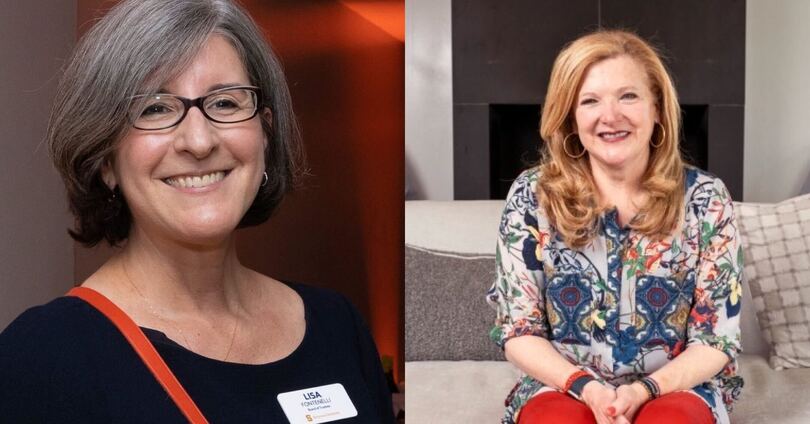Chancellor Search Committee seeks ‘transparent,’ value-aligned leader, co-chairs say

Chancellor Search Committee co-chairs Shelly Fisher and Lisa Fontenelli have spent the past week gathering feedback for what they should look for in SU's next Chancellor. In an interview with The D.O., they underscored the importance of community engagement in the search process. Courtesy of Chancellor Search Committee
Get the latest Syracuse news delivered right to your inbox.
Subscribe to our newsletter here.
After a week of gathering community input through engagement sessions, Chancellor Search Committee co-chairs highlighted the importance of feedback in shaping the university’s next leader.
In an interview with The Daily Orange, co-chairs Shelly Fisher and Lisa Fontenelli discussed their engagement sessions, community feedback and the committee’s timeline as they seek Chancellor Kent Syverud’s successor.
“This is really a campus-wide experience, but the themes and the information that are coming in from all these different constituencies, that’s what’s coming together in order to craft what this is going to look like going forward,” Fisher said.
The two found themselves leading the committee after Board Chairman Jeff Scruggs reached out to Fisher and Fontenelli, personally asking them to take on the role. The now co-chairs had several conversations before accepting the offer, they said, recognizing the commitment and responsibility the role holds.
“It is one of the most important responsibilities of the Board of Trustees to hire the chancellor, the chief executive, if you will, of the university, and so I didn’t say yes right away,” Fisher said.
As the 24-member committee — which consists of trustees, staff members, students and faculty — continues its search, it will put together a “position profile” detailing the qualities and attributes the group is looking for in candidates.
The “public-facing document” will also address the top priorities and challenges SU faces.
The engagement sessions, hosted between Sept. 21 to 29, were held in-person and on Zoom for the local community, alumni, students, staff and faculty to help the committee gather “ideal characteristics, attributes and qualifications,” according to its website.
“It’s the input from the campus community and all the stakeholders of the university that really helps us to inform what that position statement will say,” Fisher said. “We’ve learned a tremendous amount through those engagement sessions.”
Selections will be kept confidential to uphold the privacy of each candidate, Fontenelli said.
Throughout the engagement sessions, Fisher said top priorities the committee gathered from students included open and consistent communication, “especially” during times of change.
Students were also largely concerned with SU’s connections to the city of Syracuse, international student support and protecting free speech, among others.
Over a third of SU’s Center for International Services staff did not return for the fall semester, leaving the office that oversees the school’s international student body with reduced personnel.
At the University Senate’s September meeting, Syverud addressed a decline in the percentage of international students enrolled in the “undergraduate entering class,” which decreased to 5% this year from 12% two years ago.
Requested by Syverud in December 2023, the university’s “Syracuse Statement on Free Expression and Free Inquiry” outlines several commitments related to faculty and student speech on campus, highlighting the importance of promoting “free expression and free inquiry” and “open deliberation” on campus.
The statement was developed in response to USen members’ concerns that the potential for violent threats would be co-opted as an excuse to erode free speech on campus.
Students also said they’d like to maintain and enhance experiential learning, including study abroad, internships and research projects, Fontenelli said.
Fisher and Fontenelli emphasized they entered the engagement sessions and the broader search with “zero preconceived notions” about what the top priorities should be in selecting a chancellor, though they aim to find someone with the “strength” to lead the university.
“One thing that came out loud and clear (was) that people are consistently proud to represent Orange across all the engagements,” Fisher said. “But for the students, one thing … that was so impressive and thoughtful was that they thought broader than themselves and spoke passionately about getting this right for students coming after them, as well as what’s happening now.”
Representatives from Spencer Stuart, an executive search and leadership consulting firm assisting the committee, have taken “copious” notes throughout each engagement session that will be shared with the committee, Fisher said.
The firm will provide structure to the process, the co-chairs said, connecting the committee with potential candidates based on the traits it deems most important to the position profile.
“This is where we work very closely with the search firm to try to identify those people who will best match that criteria, and then try to shepherd them through the process to find the best fit for us for the next leader of the university,” Fisher said.
The committee is also accepting feedback through an anonymous survey on its Chancellor Search website. Responses will go directly to Spencer Stuart, according to its website.
The responses are also shared with the committee, Fontenelli said, and will be used to help define the position statement, which will continue to be established over the next few weeks.
Because of uncertainty in higher education, Fontenelli said the committee will particularly look for the “attributes of the candidate as a leader” and “how they’ve executed in their past experience.”
The committee’s considerations align with broader changes across higher education under President Donald Trump’s administration, targeting diversity, equity, inclusion and accessibility programs, federal funding and international students.
In July, SU closed its Office of Diversity and Inclusion and opened a new unit under the Office of Human Resources after reviewing its compliance with federal policy. In April, three international students had their visas revoked under the federal administration.
“It’s less about the specifics of that uncertainty and more about finding the right leader who will represent the things that are most important to the university,” Fontenelli said. “It’s going to be incredibly important to have a leader who will be able to respond in a way that’s transparent and also in line with the stated mission for the university.”
While the university actively reviews a number of its major programs, including 20 courses within the College of Arts and Sciences and the Renée Crown University Honors Program, Fontenelli said there’s “no doubt” the next chancellor will inherit a wide “portfolio.”
“The most important thing to know is the portfolio is important and has been deemed important by the Board of Trustees, otherwise we wouldn’t be moving forward on a number of those things,” Fontenelli said.
Fontenelli also referenced Syverud’s ongoing projects — such as new dorms, academic strategic initiatives and “big changes” happening in college athletics. But the trustees will “keep moving forward” and “adapt as necessary,” she said.
Now that the first phase of the search — engagement sessions — is over, the co-chairs intend for the position profile to be available on the Chancellor Search website by mid-October. The committee will then be in the “full-on recruitment phase,” Fontenelli said.
“Once we actually have a broad list that the committee can review, we will start the process of combing it down and moving toward having someone selected so the board can approve that person by the end of the first calendar quarter of 2026, with the idea that the new chancellor would be in place for the start of the new academic year,” Fontenelli said.
The co-chairs plan to provide frequent updates to the campus community on the search through the website and campus-wide emails.





